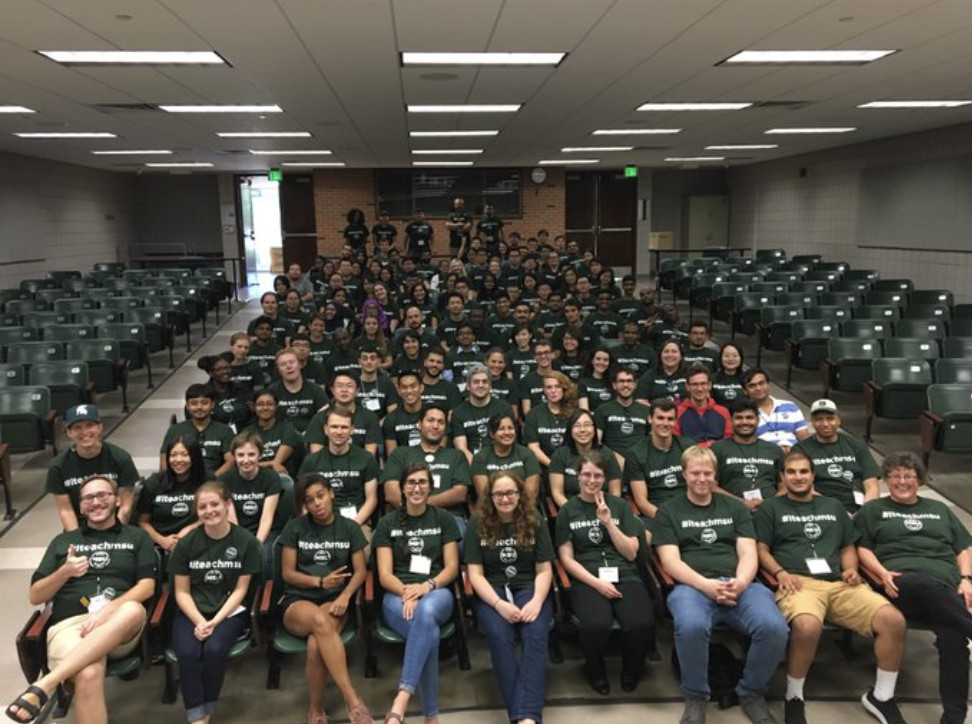Browse
Incorporating Technologies
Posted on: #iteachmsu



Posted by
over 4 years ago

Critical Component #3: Shared Inquiry and Dialogue
Dialogue is more than conversation. It is also different than debates, in which someone wins and someone loses. Dialogue requires openness to new ideas and collective learning.
Dialogue is more than conversation. It is also different than debates, in which someone wins and someone loses. Dialogue requires openness to new ideas and collective learning.
Posted on: #iteachmsu


Posted by
over 4 years ago
Classroom management is central to classroom culture. Classroom management systems must support safe, inclusive communities by promoting high standards for respectful interaction; incorporating student-generated classroom norms; teaching conflict resolution; and actively addressing all instances of bias, bullying, exclusion, or disrespect.
.ai
.ai
Posted on: #iteachmsu



Posted by
over 4 years ago

Ask the student to submit a reflection about whether the accommodation helped with demonstrating knowledge. Whenever possible, we prefer to receive the student’s original work rather than a transcript or summary of the student’s reflection. The format of the reflection can accommodate the age or disability (e.g., written, audio) of the student. If, to meet this requirement, it is necessary to submit a transcript of a conversation with the student, please report the student’s responses verbatim.
Posted on: #iteachmsu



Posted by
over 4 years ago

Identify a student with a disability in your classroom. Specifically, identify a student who has difficulty in a typical classroom setting demonstrating knowledge. For example, the student might not be able to respond through typical response formats like written tests. To protect the privacy of your student, please use a first name only, or else use an alias.
Describe the student you selected, making sure to include:
png
Describe the student you selected, making sure to include:
png
Posted on: #iteachmsu


Posted by
over 4 years ago
Emphasize higher-order thinking:
The educator emphasizes questions that require higher-order thinking (analysis, evaluation, application, interpretation, and making connections) rather than surface-level questions that merely test recall. Though it is acceptable to include lower-order questions at the beginning of the lesson or at points when students need to establish meaning in the text, students should be spending most of their time thinking beyond the surface of the text.
PPTX
The educator emphasizes questions that require higher-order thinking (analysis, evaluation, application, interpretation, and making connections) rather than surface-level questions that merely test recall. Though it is acceptable to include lower-order questions at the beginning of the lesson or at points when students need to establish meaning in the text, students should be spending most of their time thinking beyond the surface of the text.
PPTX
Posted on: #iteachmsu


Posted by
over 4 years ago
Align to an Objective:
Expert readers read with a purpose in mind. Because it is impossible to commit every word of every text that they read to memory, they see reading as a selective process, where some aspects of the text are carefully scrutinized and others de-emphasized. Likewise, we want students to focus their attention when they read and for the questions that they answer to support that focus.
.docx
Expert readers read with a purpose in mind. Because it is impossible to commit every word of every text that they read to memory, they see reading as a selective process, where some aspects of the text are carefully scrutinized and others de-emphasized. Likewise, we want students to focus their attention when they read and for the questions that they answer to support that focus.
.docx
Posted on: #iteachmsu


Posted by
over 4 years ago
Require Textual Evidence:
Questions should require students to construct knowledge from their reading rather than relying purely on their own experiences, prior knowledge, or external resources such as the Internet. If students can answer the question without actually reading the text, then the question is not textually dependent
XLS
Questions should require students to construct knowledge from their reading rather than relying purely on their own experiences, prior knowledge, or external resources such as the Internet. If students can answer the question without actually reading the text, then the question is not textually dependent
XLS
Posted on: #iteachmsu


Posted by
over 4 years ago
This section responds to concerns from Virtual School Heads that there was very limited information on ‘what works’ to improve educational outcomes for children looked after. Children looked after have frequently had disrupted educational experiences, for a variety of reasons, and their progress needs to be accelerated so that learning gaps can be closed, and they can succeed educationally in line with their peers.
